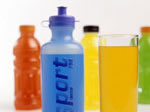Sports drinks have swamped the market in recent years and some people see them as just another class of soft drink. However, they are more than a beverage to quench your thirst. They evolved straight from the sport science laboratory, the athlete’s kit bag and team locker rooms. In fact, Gatorade was named after the Florida Gators Football team and the winning edge they achieved from staying hydrated with the special concoction of water, electrolytes and carbohydrate. Let’s take a closer look at what your body gets when you twist off that cap.
Sports drinks for energy
An important characteristic of any sports drink is that it contains carbohydrate, generally in the range of 4 to 10%. Carbohydrate is needed as an energy source for endurance exercise, particularly for training sessions lasting for greater than 90 minutes, and during games. The body’s glycogen (muscle carbohydrate) stores are likely to be depleted after 90 minutes, so it is essential that an additional source of carbohydrate is supplied. A sports drink is ideal to provide this carbohydrate in an easy to consume form.
Sports drinks are also ideal for recovery. They provide a carbohydrate that has a high glycaemic index, meaning that it is rapidly absorbed into the bloodstream resulting in fast storage as muscle glycogen.
Sports drinks for sodium
Another characteristic of sports drinks is that they contain salt or sodium (most have a sodium content 10 – 25mmol per litre). Many people express concern over the sodium content of sports drinks, believing it to be too high and therefore not so healthy. In fact, the salt content is actually comparable to that of milk, which is not considered a high salt food. The role of sodium in sports drinks is to speed up the body’s absorption of the fluid and to help replace electrolytes lost in sweat.
Savour the flavour
Several studies have also shown that people will consume more of a flavoured beverage, such as a sports drink, than of a non flavoured beverage such as water. So, sports drinks may have the advantage over water, particularly for those athletes or sportspeople who struggle to drink enough fluid to replace that lost through sweat.
See our Drink up – a hydration guide for further tips on staying hydrated.




